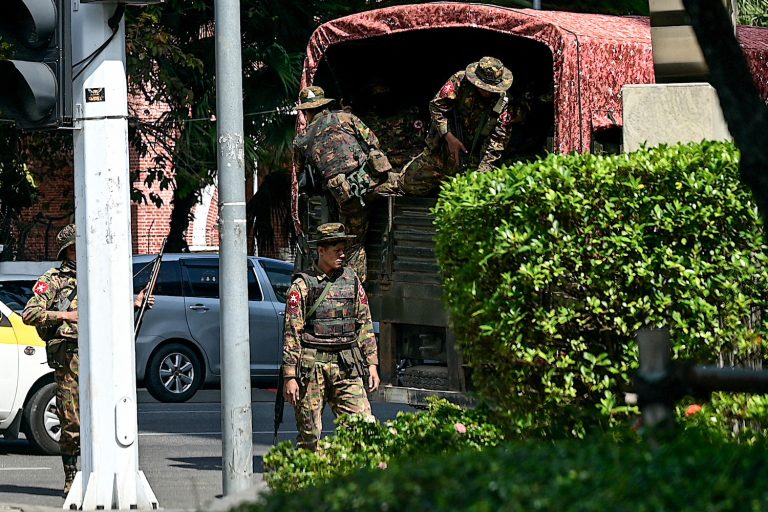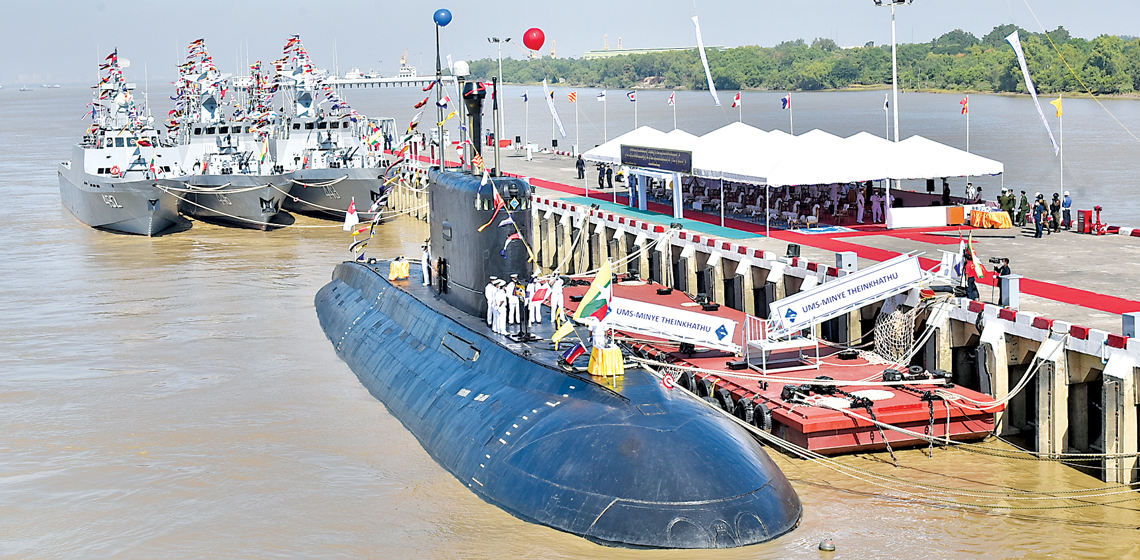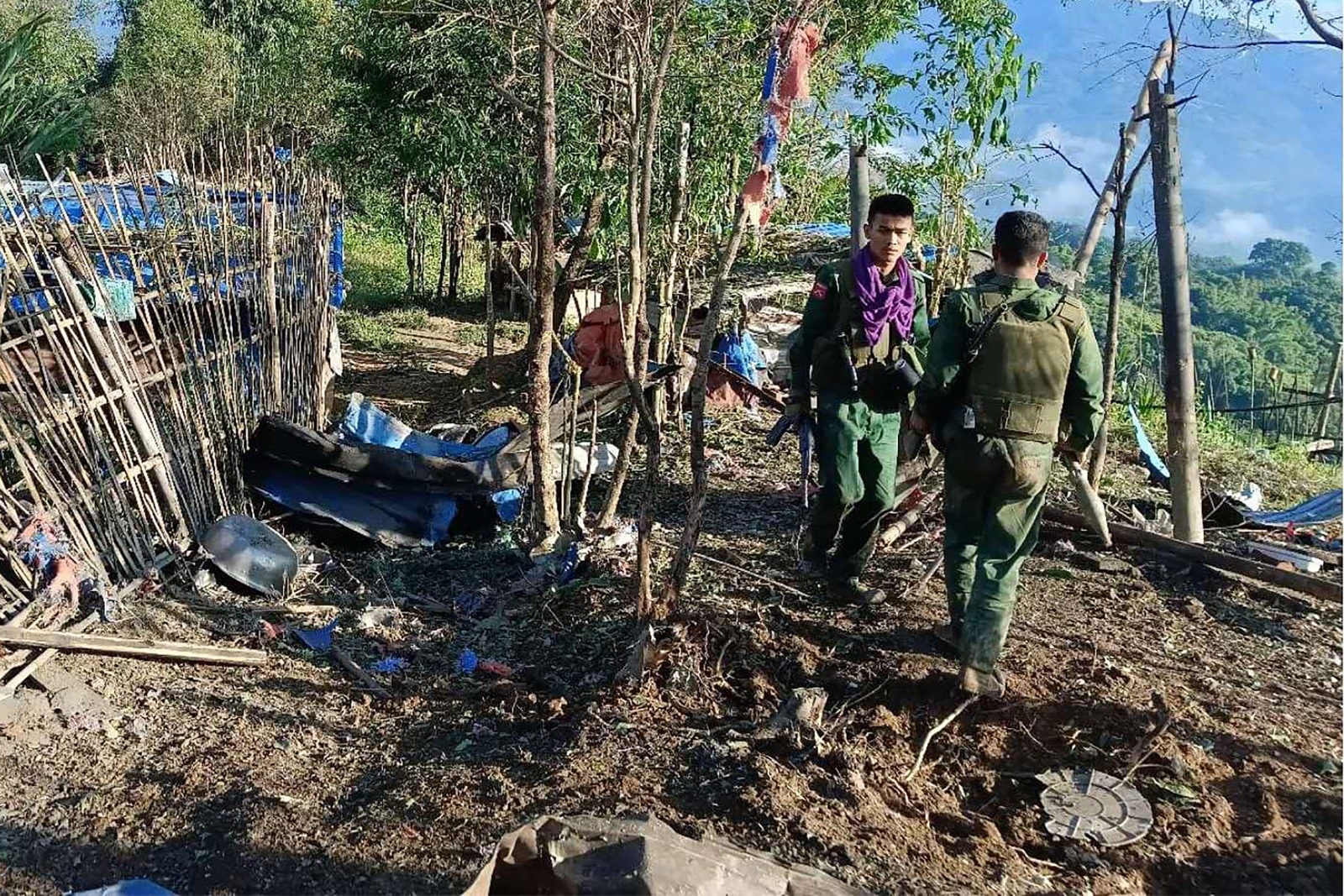The regime quietly conducted a pilot census last month, with the exercise showing glimmers of a planned surveillance state while the spectre of violence continues to loom over next year’s nationwide event.
By FRONTIER
Daw Mya Gyi* was only given a day’s warning ahead of a visit by Mawlamyine Township immigration officials last month.
“Usually, the administration office would announce that kind of news with a loudspeaker around the ward. But this time, the ward officials just informed us by going from door to door,” the 60-year-old resident of the Mon State capital said.
The next morning, three men in white shirts with electronic tablets came to her home accompanied by ward officials and police officers. She said the experience felt more like an interrogation than a census taking, but she was too afraid to refuse to answer any of their questions.
“The police were standing there fully armed. It scared me. And there were ward officers who know our family, so I had to tell the truth even though I didn’t want to,” she told Frontier.
According to Mya Gyi, the enumerators from the immigration department asked many innocuous questions, including some about her family business and annual income. But when the conversation turned to her daughter, the situation grew tense.
A former public school teacher, Mya Gyi’s daughter protested the 2021 military coup by joining a mass strike of civil servants known as the Civil Disobedience Movement, before illegally crossing the Thai border in search of work and safety.
“The worst part is when they asked about my daughter. They asked if there is a family member who works abroad. I wanted to say no, but the ward administration official already knows. So I had to say yes and then there were many follow up questions,” she said.
The enumerators asked when and why her daughter left the country, where she is now, whether she immigrated formally or informally, what is her current job abroad, how much money she sends back per year and what channels she uses to send the money.
“I didn’t want to answer because there is a lot of news about the regime restricting workers overseas,” she said.
The regime has been blocking CDM participants from leaving the country and forcing migrant workers to send some remittances via formal bank channels, allowing the military to take a cut at a more unfavourable exchange rate than the black market.
Many activists fear next year’s nationwide census will be used to identify and track down dissidents, or harass family members of those who have fled abroad or are in hiding. The junta has also framed it as a precursor to an election, roughly planned for 2025, that many believe will be a sham meant to give a veneer of legitimacy to military rule. Armed groups opposed to the regime have therefore pledged to disrupt this process, raising concerns about increased violence and civilian casualties.
The pilot census, conducted from October 1 to 15 in 100 neigbourhoods across 20 of the country’s 330 townships, showed glimmers of the regime’s planned surveillance state, but seemingly provoked no violence.
While the 20 townships were spread across the country, they appear to have been carefully selected in areas the military controls. The success of the pilot would therefore be difficult to replicate on a nationwide scale, given the raging conflict and the regime’s diminishing control over large swathes of the country.

Mapping out Myanmar
Ma Thida Soe*, a resident in the Aingwaing village tract in Ayeyarwady Region, said the regime had mapped out geographic areas for the pilot census and officials visited every home that appeared in satellite imagery.
“I told them I’m only renting this house and I might not be living here when they conduct the real census next year. But they said it doesn’t matter, they had to come here because my house is on the map,” she said.
“When they opened the tablet, a map appeared. Then they clicked on our house and entered the name of the head of household, then the questions appeared and they entered our data. I didn’t like it, because they can see exactly where we live. If they want to visit or inspect somebody’s house, they won’t need to ask the local police or administration or residents, they can just come directly. But I didn’t dare to speak about my concerns.”
The 2013 census law authorises enumerators to enter private homes and expressly forbids respondents from refusing to answer or giving inaccurate information, under threat of one month’s imprisonment.
A source from the immigration department in Shan State said that the pilot census has the same nine categories as the 2014 nationwide census, implemented under a quasi-civilian government with support from the United Nations Population Fund and Western donor countries. The UNFPA confirmed to Frontier earlier this year that it won’t assist the 2024 census, raising questions about the regime’s capacity to conduct it alone.
While there were 41 questions in 2014, there are 68 questions this year. The new additions seem to focus on migrant workers; the immigration source said there are more detailed questions about the labour force and international migration, but refused to provide Frontier with exact questions.
According to Mya Gyi and Thida Soe, they were asked about their religion and ethnicity, controversial questions that were heavily criticised for contributing to intercommunal tensions during the 2014 census. The census results on the ethnic make-up of Myanmar are considered so sensitive that they have never been made public.
But that census was conducted with a promise of confidentiality; the information would only be used to compile statistics and couldn’t be used for any other administrative purposes, including in criminal or civil court cases. While the law still requires confidentiality, the regime has said the upcoming census is a precursor to its planned election, which would indicate the information would be used to compile voter lists.
Many activists believe a main driver of the census is to get a more accurate picture of people who have left their home towns, many of whom have joined armed resistance groups or are helping provide public services in their territories.
“We are living in the midst of crazy people who are armed with weapons but not intelligence. Even without the census, our lives are at risk. If the census is taken, I think it can affect public safety far more,” said Saw Ba Oo Lay, a lawyer from the Nationwide People’s Lawyers Union Federation and an advisor to the National Unity Government, a parallel administration appointed by lawmakers deposed in the coup.
But Ba Oo Lay also said he doubts that the regime will be able to get accurate information, particularly in conflict areas, where enumerators will struggle to move freely for fear of attack. He predicted some enumerators may simply fabricate data rather than angering superiors by refusing to conduct the census.

‘I can’t say no’
According to the regime’s immigration ministry and local residents, the pilot census was carried out by township immigration department officials and local officials from the General Administration Department.
But in 2014, many public school teachers were roped into the nationwide census, raising fears that the regime could force them to do so again, placing them in harm’s way given resistance groups have committed to disrupt the process.
Resistance group Monywa Dynamite Special Task Force, which operates in Sagaing Region, said they were unaware of the pilot census, and that it took place in parts of Monywa Township far from the frontlines.
“We don’t even need to say how much we object to the pilot census. If they continue these actions in our township, we will destroy all of them,” a spokesperson said.
Daw San Htay*, a teacher in Monywa, said that she would resign if ordered to serve as a census enumerator.
“It’s very dangerous because we will have to openly visit the houses in the wards and ask questions that will take a long time. If the PDFs attack, we will be easy targets for them. The PDFs already promised to attack the census-taking process,” the 40-year-old teacher said, referring to anti-regime militias known as People’s Defence Forces.
But some other teachers say they would have no choice. Daw Kyi Win*, a 60-year-old teacher from Ayeyarwady’s Danubyu Township, who served as an enumerator in 2014, said she would have to comply in order to get her pension.
She declined to join the CDM after the coup because she was on the verge of retirement and planned to rely on her government pension in her twilight years. But the regime extended the retirement age to 62 due to a staff shortage, leaving her still in limbo.
“They always make teachers serve other duties, like census enumerators and polling station officers, I think they will probably use teachers for the next census too. If they ask me to do it, I can’t say no,” she said.
The regime seemingly pulled off the pilot census without any major hiccups, including in conflict areas like Monywa and Kayah State’s Loikaw.
But locals said the regime only operated in small urban pockets that it still controls, and wouldn’t be able to do a more comprehensive survey. In Monywa, the pilot census was taken in 10 wards and four villages just outside of the city. It was even more limited in Loikaw, where enumerators visited just one ward and one village near the town.
Ko Bo Bo, spokesperson for the Karenni State Police Force, an opposition police unit formed by officers who joined the CDM, said the regime just did the census in a couple areas for show.
“We’re not worried about it at all. The only area they can conduct a census in is Loikaw town. If they try to go outside of the town, they will have to risk their lives,” he said. “Actually, the junta can’t even collect data on the population of Karenni State because most of the towns are empty from people fleeing the war.”
*indicates the use of a pseudonym for security reasons







